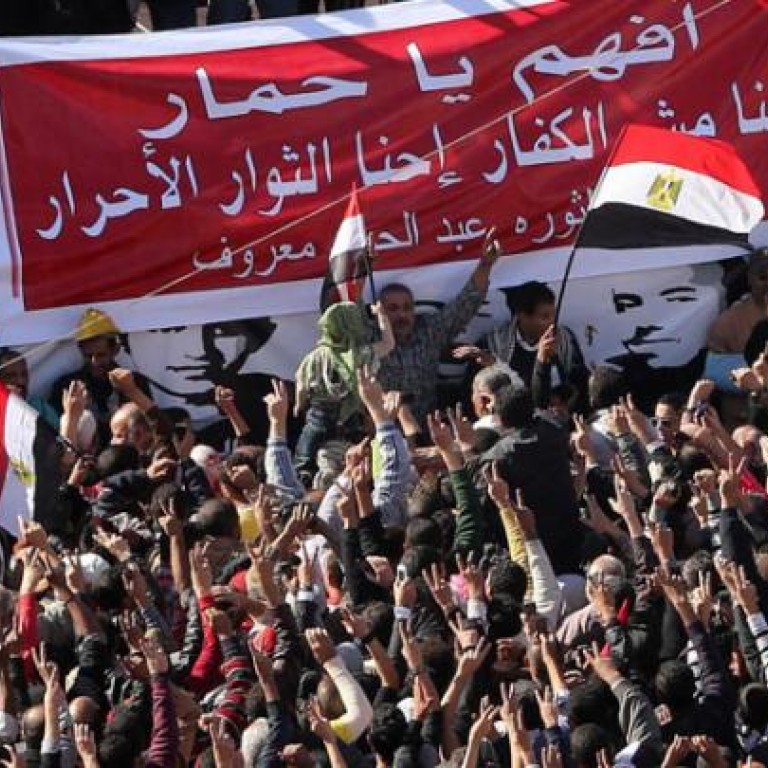
Echoes of Mubarak in defiant Mursi speech as protests continue
Defiant president blames paid provocateurs for political instability swamping country and refuses to compromise with opposition groups
In a televised speech reminiscent of toppled leader Hosni Mubarak, Egyptian President Mohammed Mursi blamed two weeks of political turmoil that have engulfed his nation on "paid elements," and refused to make any concessions to his opponents.
The address late on Thursday angered protesters camped out in the capital, Cairo, sparking scenes that were eerily similar to events in the days leading to the dictator's fall.
As Mursi spoke, protesters who were gathered outside the presidential palace became increasingly angry, their chants of "Leave. Leave. Leave. Leave." growing louder, much as happened when Mubarak first addressed the nation in February last year, after a week of protests. In that speech, Mubarak said that hired "political forces" were inciting the crowds.
After Mursi spoke, protesters set several Muslim Brotherhood headquarters on fire, including the one in Cairo. Two years earlier, protesters set Mubarak's party headquarters ablaze; the charred building still stands unrepaired.
For Mursi opponents, the speech was a sign that Mursi was unwilling to entertain their complaints that he had become a dictator just five months after the nation's first democratic election had elevated him to the presidency. They vowed to continue their protests.
"This was the speech of a dictator," said Mohamed Radwan, 33, an engineer who was among those protesting outside the palace.
Opposition leader Mohamed ElBaradei, responding to the speech, said Mursi's government had lost its legitimacy after violence on Wednesday outside the presidential palace left six people dead and hundreds injured. "It is now difficult to negotiate after innocent blood was shed," ElBaradei said.
Within the government, resignations continued coming. A Christian adviser and the director of state broadcasting stepped down in opposition, joining three Mursi advisers who resigned on Wednesday.
US President Barack Obama, in a phone call to Mursi, expressed "deep concern about the deaths and injuries of protesters in Egypt," the White House said. In a statement, the White House added that Obama "emphasised that all political leaders … should make clear to their supporters that violence is unacceptable" and that negotiations should take place "without preconditions".
Mursi's speech was a mix of seeming contradictions. He appeared to reach out to opponents, inviting them to meet with him today. But at the same time he promised no compromise.
"I cannot compromise because my enemies have not yet been vanquished," he said.
At another point, he made it clear that he believed his legitimacy flowed from his election to the presidency and that those whose candidates lost should let him govern. "I won't tolerate anyone working to overthrow a legitimate government," he said.
Still, he urged opponents to attend talks today and said that everyone was free to vote against the proposed constitution in the referendum he's set for December 15. If the constitution was defeated, Mursi would then appoint a new constitutional assembly to draft another document.
But who was invited and what could come of such discussions was not clear. ElBaradei, the former head of the International Atomic Energy Agency and Nobel Peace Prize winner who on Wednesday was named the leader of the opposition, said he would not attend.
The current crisis began on November 22, when Mursi declared that his decisions could not be reviewed by the country's judges. It continued when the constitutional assembly, which is dominated by the Muslim Brotherhood, hastily completed a draft constitution before a court ruling could have dissolved the assembly. Mursi quickly approved the document and set December 15 for the country to vote on it.
"The really unfortunate side effect of the last two weeks is the political atmosphere has become really toxic," said Elijah Zarwan, a fellow with the European Council on Foreign Relations. "I fear that could endure long past the current crisis."
"The next government is going to have to move very quickly to address many problems and it will need cooperation. In the current atmosphere, it is hard to imagine others cooperating."
